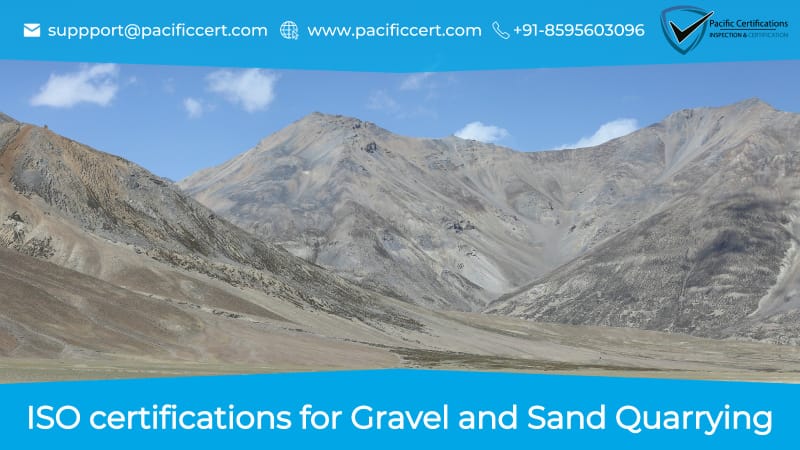ISO Certifications for Gravel and Sand Quarrying, Requirements and Benefits

Introduction
Gravel and sand quarrying operations function in dynamic extraction environments where companies perform overburden removal, aggregate excavation, crushing and screening, washing and grading, stockpile management, and material transportation serving construction, concrete production, asphalt manufacturing, and infrastructure development sectors worldwide. These businesses face critical challenges including protecting workers from equipment accidents, silica dust exposure, and slope instability hazards, managing significant environmental impacts from dust emissions, water consumption, and habitat disturbance, maintaining product quality specifications for construction standards, and operating under community scrutiny regarding noise, truck traffic, and visual impacts.
ISO certifications are essential for gravel and sand quarrying because they provide systematic frameworks ensuring worker safety, environmental stewardship, product quality, and operational efficiency—requirements increasingly demanded by construction industry customers, regulatory authorities enforcing air quality and water discharge standards, concrete producers requiring consistent aggregate specifications, and communities expecting responsible quarry operations. Quarrying operations encompass site geological assessment establishing deposit characteristics and extraction planning, overburden stripping and stockpiling, aggregate extraction through hydraulic excavation or dragline operations, material processing including crushing, screening, and washing to size specifications, and environmental management covering dust suppression, water treatment, progressive rehabilitation, and noise control. The industry faces mounting pressures from environmental regulators enforcing air quality standards for silica dust and particulate matter, water authorities requiring discharge permits and sediment control, occupational safety agencies mandating respiratory protection and equipment safety programs, and local communities demanding environmental performance verification and rehabilitation guarantees.
In gravel and sand quarrying, systematic environmental management and product quality determine operational license and market access
Quick Summary
ISO certifications provide gravel and sand quarrying with internationally recognized frameworks to manage service quality through ISO 9001, environmental impact through ISO 14001, occupational safety through ISO 45001, energy efficiency through ISO 50001, asset management through ISO 55001, and risk management through ISO 31000.
For more information on how we can assist your gravel and sand quarrying business with ISO certifications, contact us at [email protected].
Applicable ISO Standards for Gravel and Sand Quarrying Businesses
Below are the most relevant ISO standards applicable to sand and gravel pit operators, aggregate producers, quarry contractors, and integrated crushing and screening facilities:
ISO 9001:2015 - Quality Management Systems
ISO 9001 enables gravel and sand quarrying operations to standardize extraction processes, processing procedures, quality controls, and product specifications ensuring consistent gradation, cleanliness, and particle shape meeting concrete production, asphalt manufacturing, and construction fill requirements. This standard helps organizations demonstrate professional competency required for ready-mix concrete and asphalt plant supply chain qualification, improve operational efficiency, enhance customer satisfaction with consistent aggregate specifications, and reduce waste from off-specification production requiring reprocessing.
ISO 14001:2015 - Environmental Management Systems
ISO 14001 is critical for gravel and sand quarrying operations addressing environmental impacts including dust emissions from crushing, screening, and haulage, water consumption and turbidity in wash plants, noise from processing equipment and truck traffic, habitat disturbance from extraction expansion, and groundwater dewatering impacts requiring systematic monitoring and control. With environmental agencies requiring ISO 14001 certification for quarry permits in some jurisdictions and construction customers demanding environmental verification, this standard helps quarry operators prevent violations, demonstrate environmental stewardship, and maintain social license in communities near extraction sites.
ISO 45001:2018 - Occupational Health and Safety Management Systems
ISO 45001 addresses severe safety risks in quarrying including silica dust exposure causing silicosis and lung disease, mobile equipment collisions and rollovers, conveyor and crusher entrapment, slope failures and highwall collapses, falls from heights on processing plants, and drowning hazards in water-filled pits through systematic hazard identification and control implementation. With proper implementation reducing workplace accidents by 30-50% and preventing quarry fatalities, this standard is essential for regulatory compliance with mine safety authorities, maintaining operational licenses, and protecting workforce respiratory health from silica exposure.
ISO 50001:2018 - Energy Management Systems
ISO 50001 is essential for gravel and sand quarrying operations managing significant energy consumption from crushing equipment, screening plants, wash plant pumps, conveyors, and diesel-powered mobile equipment through systematic energy monitoring and optimization programs. This standard helps quarry companies reduce energy costs representing major operational expenses especially in crushing and washing, lower carbon emissions supporting construction industry sustainability commitments, and improve energy performance through equipment efficiency upgrades and process optimization.
ISO 55001:2014 – Asset Management Systems
ISO 55001 provides frameworks for managing expensive quarrying assets including excavators, loaders, haul trucks, crushers, screens, and wash plants through systematic maintenance planning, lifecycle management, and reliability optimization. This standard helps quarrying operations maximize equipment availability preventing production bottlenecks, optimize maintenance investments, extend asset lifespans in abrasive environments, and improve return on capital expenditures critical for profitability in competitive aggregate markets.
Click here to find out more applicable standards to your industry
What are the Requirements of ISO Certifications for Gravel and Sand Quarrying Businesses?
Gravel and sand quarrying operators seeking ISO certification must establish and maintain documented policies, procedures, and records aligned with the selected ISO standards. Key requirements include the following:
ISO 14001:2015 – Environmental Management Systems Requirements
Conduct impact assessments identifying dust emissions, water consumption, turbidity, noise, habitat disturbance, and groundwater impacts
Establish environmental objectives for dust control effectiveness, water recycling rates, noise limits, and progressive rehabilitation
Implement operational controls including dust suppression systems, water recycling circuits, noise barriers, and biodiversity monitoring
Define waste procedures for overburden management, wash plant fines disposal, equipment waste oils, and scrap recycling
Maintain monitoring programs for air quality, water discharge turbidity, noise levels, groundwater quality, and rehabilitation success
Conduct compliance audits ensuring adherence to air permits, water discharge limits, noise restrictions, and rehabilitation requirements
ISO 45001:2018 – Occupational Health and Safety Management Systems Requirements
Establish safety policy with measurable objectives for zero fatalities, injury reduction, and silica exposure limits
Conduct hazard identification covering silica dust exposure, equipment collisions, entrapment, slope failures, falls, and drowning hazards
Implement hierarchical controls including dust suppression, collision avoidance, equipment guarding, slope monitoring, and respiratory protection
Define competency requirements for equipment operation, confined space entry, working near water, and emergency response
Maintain health surveillance monitoring silica dust exposure with regular medical examinations and respiratory function testing
Conduct incident investigations with root cause analysis, corrective actions, and lessons learned across operations
ISO 9001:2015 – Quality Management Systems Requirements
Establish quality policy defining commitment to aggregate gradation consistency, cleanliness, and customer satisfaction objectives
Document standardized procedures for extraction, crushing, screening, washing, testing, and stockpile management with quality checkpoints
Implement quality controls including sieve analysis, moisture content, fines content, particle shape, and contaminant testing
Define calibration programs for screens, testing equipment, weighing systems, and laboratory instruments with maintenance schedules
Maintain operational documentation including extraction plans, production records, test certificates, and customer specifications
Conduct management reviews assessing production metrics, quality conformance, customer complaints, and improvement initiatives
ISO 50001:2018 – Energy Management Systems Requirements
Establish energy policy with measurable objectives for electricity and fuel consumption reduction per ton produced
Conduct baseline assessments identifying diesel consumption, crusher energy, screen power, wash plant pumps, and conveyor loads
Implement performance indicators measuring energy per ton of aggregate produced, crushing efficiency, and wash plant optimization
Define operational controls including equipment load optimization, idle time reduction, wash plant water recycling, and conveyor efficiency
Maintain energy monitoring with metering for major processing equipment, mobile fleet tracking, and efficiency data analysis
Conduct energy audits evaluating crusher efficiency, screening optimization, pump performance, and renewable energy integration
ISO 31000:2018 – Risk Management Requirements
Establish risk frameworks identifying slope failures, equipment accidents, dust violations, water discharge exceedances, and market volatility
Conduct risk assessments covering operational hazards, geotechnical stability, environmental incidents, safety accidents, and financial exposures
Implement mitigation strategies including slope monitoring, equipment maintenance, dust controls, water treatment, and customer diversification
Define monitoring processes with highwall inspections, safety tracking, environmental compliance audits, and equipment diagnostics
Maintain risk registers documenting risks, assessments, treatment plans, and ownership assignments across functions
Integrate risk considerations into extraction planning, equipment investments, environmental controls, and expansion strategies
Tip: Begin with your quarrying operation's most visible requirements—dust control for community relations, product quality for customer satisfaction, and silica exposure protection for worker health—then implement ISO standards systematically. Document existing procedures for dust suppression, quality testing, safety protocols, environmental monitoring, and equipment maintenance, identifying enhancement opportunities through gap assessment.
For more information on how we can assist your gravel and sand quarrying business with ISO certifications, contact us at [email protected]
What are the Benefits of ISO Certifications for Gravel and Sand Quarrying Businesses?
ISO certifications are suitable for sand and gravel pit operators, aggregate producers, quarry contractors, and integrated crushing and screening facilities. Implementing these standards delivers measurable operational improvements:
Improved occupational health preventing silica-related diseases and equipment injuries through systematic exposure controls
Stronger environmental performance avoiding dust and discharge violations while maintaining licenses and expansion approvals
Better process optimization increasing aggregate production efficiency and reducing processing costs per ton
Stronger quality assurance delivering consistent gradation and cleanliness meeting construction specifications
Enhanced stakeholder engagement improving credibility with regulators, communities, and construction customers
Reduced energy costs optimizing crushing and washing performance while lowering electricity and fuel consumption
Greater asset reliability preventing crusher and mobile equipment failures while improving production availability
Improved regulatory compliance ensuring adherence to air, water, noise, and rehabilitation requirements while reducing penalties
Better investor relations supporting expansion financing through demonstrated environmental and safety performance
Improved market positioning accessing tier-one concrete and asphalt customers requiring certified aggregate suppliers
The global construction aggregates market demonstrates strong growth, projected to reach USD 792.3-824.8 billion in the coming years at 5.8-6.5%CAGR, driven by infrastructure investment, urbanization, residential construction, renewable energy facility development, and sustainable building practices increasing aggregate demand. Regulatory requirements are intensifying globally with environmental authorities enforcing stricter air quality standards for silica dust, water agencies requiring discharge permits and sediment controls, and construction customers demanding ISO 14001 certification for sustainable sourcing verification.
Gravel and sand quarrying operations implementing ISO-certified management systems report enhanced safety culture reducing silica exposure and accident rates by 30-50%, improved environmental performance preventing dust and water violations, optimized processing efficiency with 12% downtime reduction through systematic maintenance, and strengthened market access to premium construction customers requiring certified suppliers. ISO certification is transitioning from optional to preferred, with construction procurement increasingly favoring environmentally certified aggregate sources, recycled aggregate adoption creating quality assurance requirements, technology integration including automation and digital monitoring requiring systematic frameworks, and sustainability focus driving ISO 14001 and ISO 50001 adoption as green building standards demand low-carbon aggregate supply chains.
How Pacific Certifications Can Help?
Pacific Certifications, accredited by ABIS, acts as an independent certification body for gravel and sand quarrying businesses by conducting impartial audits against applicable ISO standards. Our role is to objectively assess whether documented management systems and quarrying operational practices conform to international ISO requirements, based strictly on verifiable evidence and operational records.
We support gravel and sand quarrying providers through:
Independent certification audits conducted in accordance with ISO/IEC 17021 standards ensuring objective assessment
Practical assessment of real quarrying operations including extraction sites, processing plants, environmental controls, and safety protocols
Clear audit reporting reflecting conformity status, specific findings, observations, and certification decisions
Internationally recognized ISO certification upon successful compliance supporting regulatory approvals and customer qualification
Surveillance and recertification audits maintaining certification validity and verifying ongoing conformance with evolving standards
Contact us
If you need support with ISO certification for your gravel and sand quarrying business, contact us at [email protected] or +91-8595603096.
Author: Ashish

